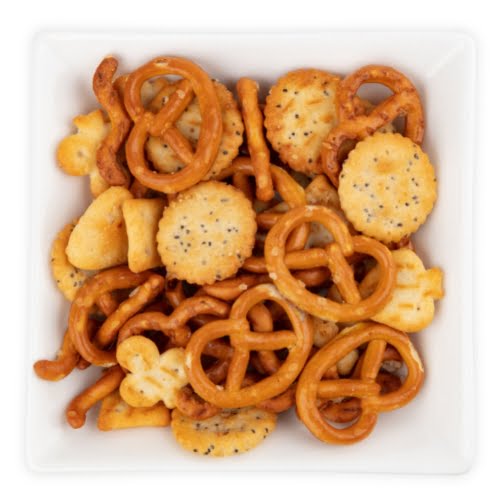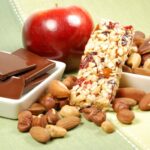Snacking can play an essential role in maintaining overall health and well-being. Eating regular, balanced meals and snacks throughout the day can help control blood sugar levels and provide the body with the energy and nutrients it needs to function correctly.
Skipping the main meals or going too long without eating can lead to feelings of fatigue, irritability, and decreased concentration. Additionally, healthy snacking can help to curb cravings for unhealthy foods and prevent overeating at mealtimes.
It can also aid in weight management since healthy snacks can help reduce calorie intake and keep you full for longer. Overall, incorporating healthy snacking into a daily routine can help to improve overall health and wellness.
Table of Contents
List of healthy snacks
- Fresh fruits and vegetables: Apples, berries, grapes, oranges, carrot sticks, celery, cherry tomatoes, cucumber slices, etc.
- Whole grains and high-fiber options: Whole wheat crackers, oatmeal, quinoa, brown rice cakes, whole grain granola bars, etc.
- Lean protein sources: Hard-boiled eggs, turkey or chicken breast slices, Greek yogurt, edamame, cottage cheese, etc.
- Healthy fats: Nuts and seeds (almonds, walnuts, sunflower seeds, etc.), avocado, hummus, etc.
- Plant-based options: Roasted chickpeas, kale chips, guacamole, etc.
- Low-sugar options: Berries, dark chocolate, plain Greek yogurt with honey, etc.
- Seed & Nut Butter: Almond butter, sunflower seed butter, pumpkin seed butter, etc.
- Dried Fruits: apricots, cranberries, raisins, etc.
- Low-fat cheese sticks
- Low-fat milk or yogurt smoothies
List of unhealthy snacks

- Fried foods: French fries, fried chicken, onion rings, etc.
- Processed snacks: Potato chips, corn chips, cheese puffs, etc.
- Sugary treats Cookies, candy, cake, ice cream, etc.
- High-calorie drinks: Soda, energy drinks, sweetened teas or coffees, etc.
- Salty snacks: Pretzels, popcorn, crackers, etc.
- High-fat snacks: Fried cheese sticks, bacon, sausages, etc.
- Processed meat snacks: Jerky, pepperoni, salami, etc.
- High-calorie dips: Ranch, cheese dips, etc.
- Pre-packaged pastries: Donuts, croissants, danishes, etc.
- High-calorie granola bars and energy bars that are loaded with sugar and artificial ingredients.
Be aware that not all snacks that fall into these categories are unhealthy, and some may be fine to consume in moderation. However, it’s generally best to limit your consumption of these types of snacks and opt for healthier options instead.
list of Tips for Incorporating Healthy Snacks into Your Diet
- Plan ahead: Plan your snacks in advance, and ensure healthy options are available at all times.
- Keep healthy snacks readily available: Stock your pantry and fridge with healthy snack options so they are easily accessible when you need them.
- Avoid snacking out of boredom: Instead of snacking mindlessly, make sure to only eat when you are starving.
- Incorporate snacking into your daily routine: Make snacking a part of your daily routine, such as having a mid-morning or mid-afternoon snack to help keep your energy levels up.
- Experiment with new healthy snack options: Try new snacks to find different tastes, textures, and options that you like.
- Be mindful of portion size: Even healthy snacks should be consumed in moderation.
- Choose nutrient-dense options: Look for snacks that are high in fiber, protein, vitamins, and minerals.
- Consider timing: Eating a healthy snack before or after a workout can help to provide energy and aid in recovery.
- Use a smaller plate: Use a smaller plate or bowl for your snack, which can help to control portion sizes.
- Listen to your body: Pay attention to how your body feels after eating different snacks and adjust your choices accordingly.
The negative effects of unhealthy snacking
Health Consequences
- Weight gain and obesity
- Increased risk of chronic diseases (such as diabetes, heart disease, and high blood pressure)
- Nutrient deficiencies
- Tooth decay and oral health problems
Psychological Consequences
- Guilt and shame associated with unhealthy eating habits
- Reduced self-esteem and body image issues
- Increased stress and emotional eating
Impact on Daily Life
- Decreased energy and productivity
- Difficulty in achieving personal and professional goals
- Difficulty in sticking to a healthy diet and exercise routine.
Frequent Questions
What are some good snacks for weight loss?

Some good snacks for weight loss include fresh fruits and vegetables, whole grains and high-fiber options, lean protein sources, healthy fats such as nuts and seeds, and low-sugar options such as berries and dark chocolate. Plant-based options like roasted chickpeas and kale chips can also be good choices. It’s important to pay attention to portion sizes and choose nutrient-dense options that are high in fiber, protein, vitamins, and minerals.
What snacks I can eat during my period?
popcorn, Salamon, Kale, Vegetables, Chocolate, Bananas, Orange, and watermelon.
In conclusion, snacking can play an important role in maintaining overall health and well-being, but it’s important to make sure that the snacks you choose are healthy and nutrient-dense.
Incorporating healthy snacking into your daily routine can help to improve energy levels, control blood sugar, and aid in weight management. Some healthy snack options include fresh fruits and vegetables, whole grains, lean protein sources, healthy fats, and low-sugar options.
Avoiding unhealthy snacks such as fried foods, processed snacks, sugary treats, and high-calorie drinks can help to prevent weight gain and chronic diseases, as well as improving oral health and emotional well-being.
By planning ahead, keeping healthy options readily available, and being mindful of portion size, you can make healthy snacking a part of your daily routine and achieve your health and wellness goals.





